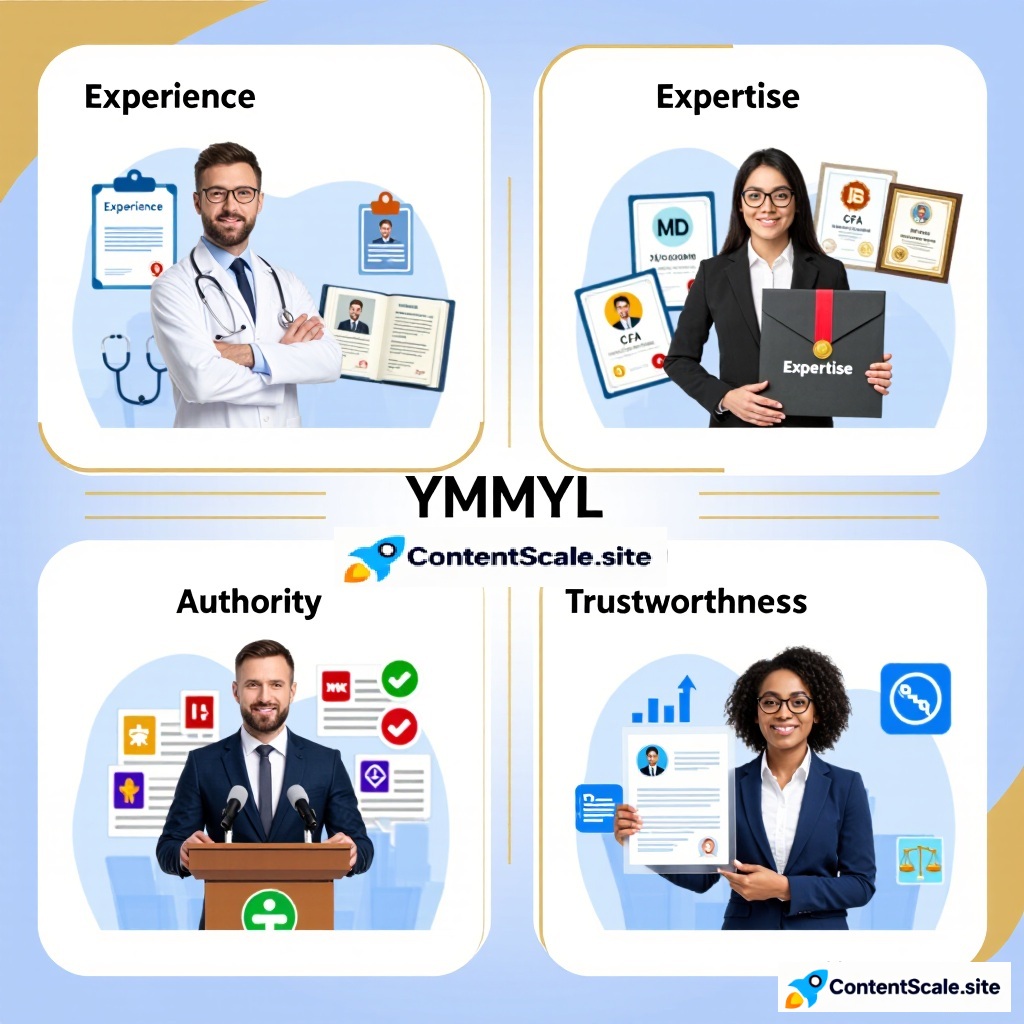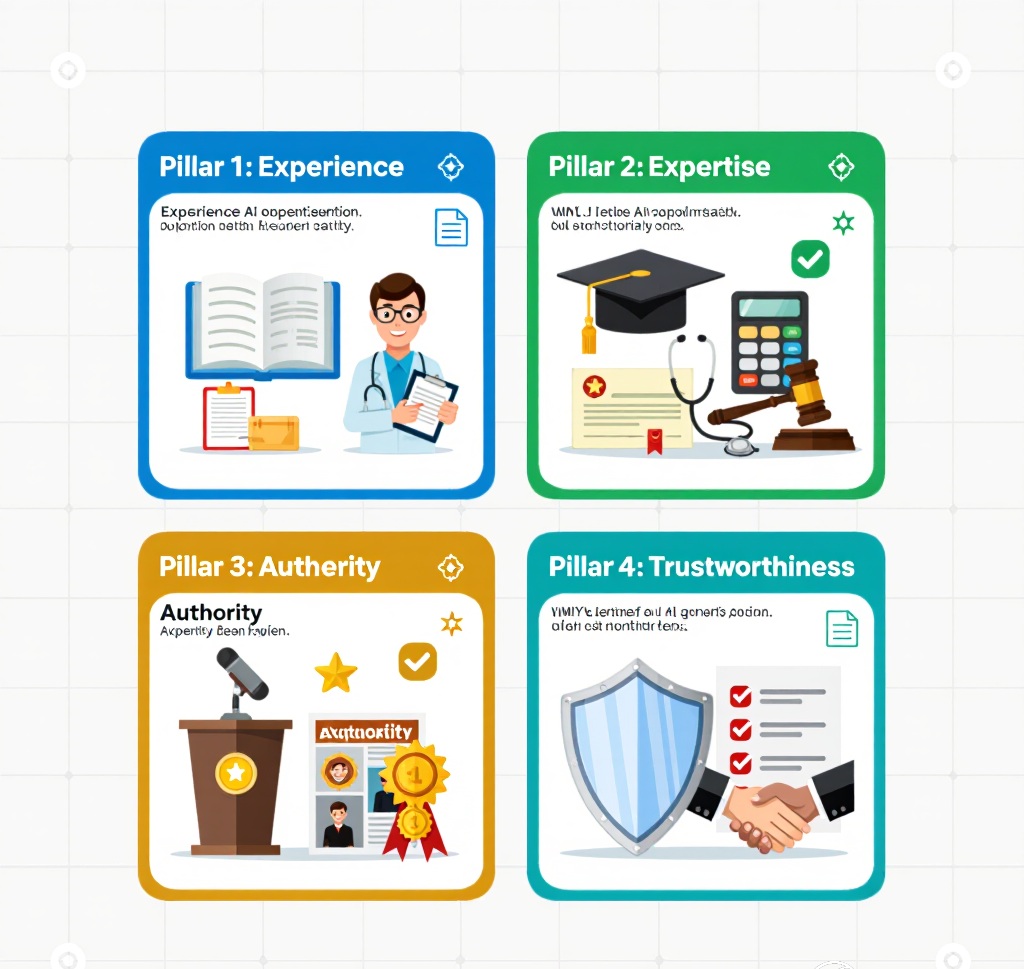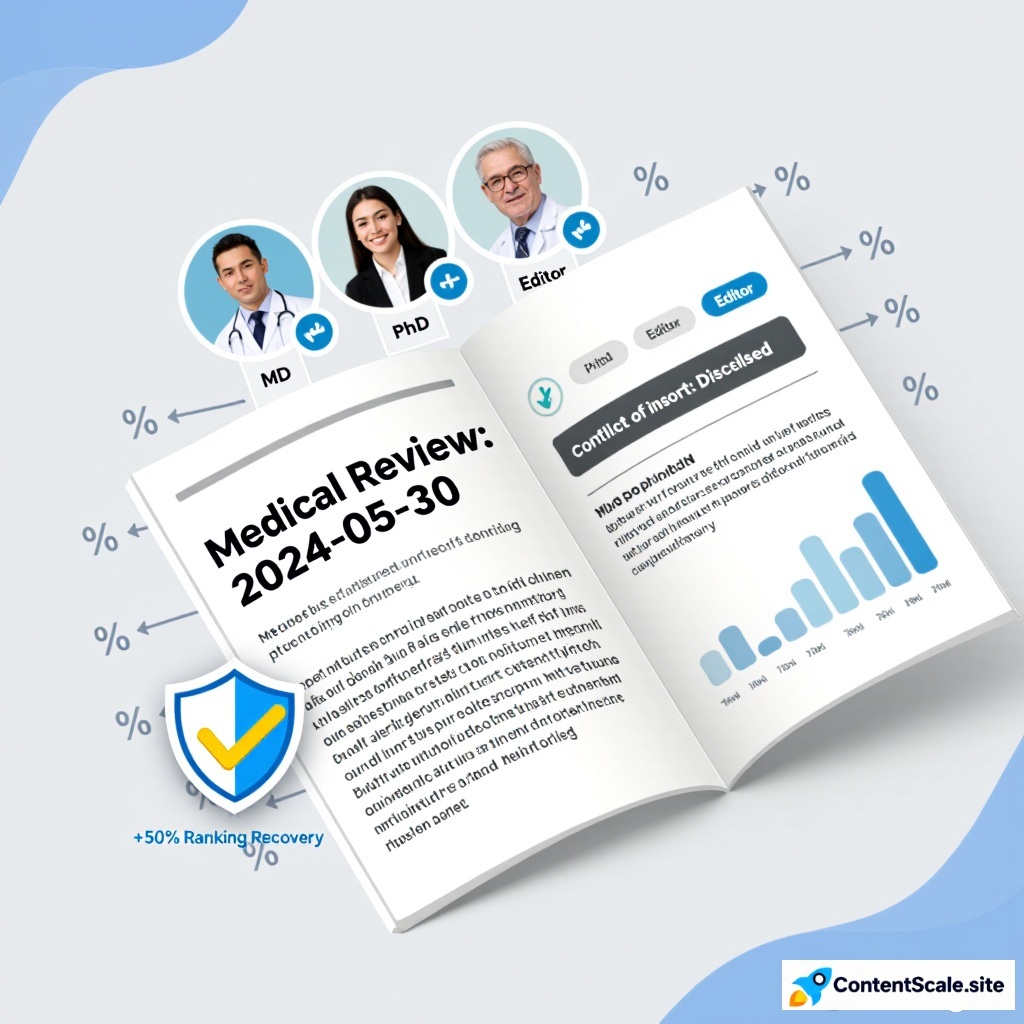YMYL AI optimization has become critical for health, finance, and legal content competing in AI Overviews. When Google’s AI prioritizes E-E-A-T signals over keywords, YMYL content optimization requires a different strategy than generic SEO. This guide shows the complete YMYL AI optimization framework used by 180+ health, finance, and legal sites to maintain visibility and recover traffic after algorithm updates.

YMYL AI optimization: E-E-A-T pillars determine AI Override inclusion more than keywords
Table of Contents
- Why YMYL AI Optimization Is Different Than Standard SEO
- The Four Pillars of YMYL AI Optimization: E-E-A-T Framework
- YMYL Content Optimization Checklist: Phase-by-Phase Implementation
- YMYL AI Optimization by Industry: Industry-Specific Strategies
- YMYL Content Optimization FAQ
- Related YMYL Optimization Articles
Why YMYL AI Optimization Is Different Than Standard SEO
YMYL AI optimization operates under completely different rules than generic search optimization. When your content affects health, financial, or legal decisions, Google treats YMYL content differently. AI Overviews now amplify this bias—they almost exclusively cite health content from doctors, finance from CPAs, legal from attorneys.
The traditional keyword-density approach fails for YMYL AI optimization because Google’s AI asks: “Who wrote this?” before asking “What are the keywords?” This represents a fundamental shift. Generic content optimization focuses on query matching. YMYL content optimization focuses on proving the author can be trusted with life-altering advice.
YMYL Content Affected by AI Optimization Changes
- Health & Medical: Disease information, treatment recommendations, supplement reviews, mental health advice
- Finance & Investment: Investment advice, retirement planning, financial recommendations, cryptocurrency guidance
- Legal & Government: Legal advice, immigration guidance, tax strategies, constitutional interpretation
- News & Current Events: Political coverage, election results, breaking news affecting public understanding
- Civic Information: Voting information, government processes, public health guidance

YMYL AI optimization: visible E-E-A-T signals determine AI Override inclusion more than keywords alone
The Four Pillars of YMYL AI Optimization: E-E-A-T Framework
Pillar 1: Experience – YMYL AI Optimization Through Author Background
YMYL content optimization starts with proving the author has real experience with the topic. AI Overviews prioritize health content from people who’ve worked in healthcare, finance content from people with financial backgrounds, legal content from licensed attorneys. Generic writing experience doesn’t count for YMYL AI optimization.
YMYL AI optimization requirements:
- Author byline with professional credentials prominently displayed
- Years of experience in the specific field mentioned
- Patient case studies, client examples, or personal stories demonstrating real-world experience
- Published works in peer-reviewed journals or respected publications
- Speaking engagements or conference participation demonstrating recognized expertise
Pillar 2: Expertise – YMYL Content Optimization Through Credentials
YMYL content optimization requires visible proof of formal education and credentials. For YMYL AI optimization, a degree from accredited institutions matters. A nurse writing about health (Pillar 2: Expertise) is stronger for YMYL content optimization than a journalist writing about health.
YMYL AI optimization credentials:
- Medical degrees (MD, DO, DDS, DPM) for health YMYL content optimization
- Financial designations (CFA, CFP, CPA) for finance YMYL optimization
- Legal credentials (JD, Bar license) for legal YMYL content optimization
- Nursing or specialized healthcare certifications
- Professional licenses and certifications in relevant field
Pillar 3: Authority – YMYL AI Optimization Through Recognition
Authority is external recognition that you’re a legitimate expert. For YMYL content optimization, being quoted in major publications, having media mentions, or professional affiliations prove authority. AI Overviews prioritize health content from doctors who’ve been featured in WebMD or Mayo Clinic, not unknown practitioners. This is core to competitive YMYL AI optimization.
YMYL content optimization authority signals:
- Media mentions and press coverage in established outlets
- Professional association memberships (American Medical Association, Bar Association, CFA Society)
- Speaking engagements at recognized conferences
- Author profiles on established health/finance/legal platforms
- Social media verification badges and significant following
- Recommendations or endorsements from other recognized experts
Pillar 4: Trustworthiness – YMYL AI Optimization Through Transparency
Trustworthiness is the most critical pillar for YMYL content optimization. For YMYL AI optimization, this means complete transparency about conflicts of interest, funding sources, and potential biases. A financial advisor recommending stocks must disclose if they benefit from the recommendation. This transparency is mandatory for competitive YMYL AI optimization.
YMYL content optimization trustworthiness requirements:
- Clear conflict-of-interest disclosures (do you profit from recommendations?)
- Funding source transparency (who paid for this research?)
- Medical review badges and dates showing current review
- Citations to peer-reviewed sources and authoritative references
- Clear disclaimers about when to seek professional advice
- Correction policies and transparent updating practices

YMYL AI optimization case study: complete E-E-A-T signals + medical review = traffic recovery
YMYL Content Optimization Checklist: Phase-by-Phase Implementation
Phase 1: Author Credential Signaling (Week 1-2)
Start YMYL content optimization by making author credentials instantly visible. For YMYL AI optimization, burying credentials in an “About” page doesn’t work—Google’s AI needs to see credentials on the content itself or in immediately accessible profile.
| YMYL Content Optimization Element | Why It Matters for YMYL AI Optimization | Implementation |
|---|---|---|
| Author Byline | Shows who wrote the content—first E-E-A-T signal | Visible at top of article: “Written by Dr. Jane Smith, MD” |
| Credentials Display | Proves formal qualifications for YMYL content optimization | MD, DDS, CPA, CFA, JD displayed prominently with byline |
| Experience Statement | Demonstrates real-world application for YMYL optimization | “15 years of clinical practice in cardiology” under byline |
| Profile Link | Allows readers to verify credentials—builds trustworthiness | Linked profile page with full credentials and background |
Phase 2: Medical/Professional Review Implementation (Week 2-3)
For YMYL content optimization, medical review is non-negotiable. AI Overviews heavily prioritize content with medical review dates. This signals to Google that qualified professionals have verified accuracy for YMYL AI optimization purposes.
YMYL AI optimization review requirements:
- Medical review by licensed healthcare provider (not just editor)
- Review date must be current (within 6-12 months for health content)
- Reviewer credentials must be displayed (Name, MD, specialty)
- Financial review by CPA/CFP for finance content YMYL optimization
- Legal review by licensed attorney for legal YMYL content optimization
Phase 3: Conflict-of-Interest & Disclosure Implementation (Week 3-4)
YMYL content optimization requires explicit conflict-of-interest management. If a financial advisor recommends a service where they earn commission, YMYL AI optimization demands clear disclosure at the point of recommendation.
YMYL optimization disclosure examples:
- “Author disclaimer: I receive commission from X product recommendation”
- “Financial disclosure: This article was updated with funding from Z foundation”
- “Medical disclaimer: Consult your physician before following advice”
- “Legal disclaimer: This is not legal advice; consult a licensed attorney”

YMYL AI optimization means transparent E-E-A-T signaling: credentials, review, disclosures, verification
Phase 4: E-E-A-T Schema Markup Implementation (Week 4+)
YMYL content optimization requires schema markup so AI Overviews can parse E-E-A-T signals programmatically. Without schema, Google’s AI must infer credentials from text—prone to error. YMYL AI optimization demands explicit schema:
<script type="application/ld+json">
{
"@context": "https://schema.org",
"@type": "Article",
"author": {
"@type": "Person",
"name": "Dr. Jane Smith",
"jobTitle": "Cardiologist",
"description": "15 years of clinical practice"
},
"reviewedBy": {
"@type": "Person",
"name": "Dr. John Doe, MD",
"jobTitle": "Medical Reviewer"
},
"datePublished": "2025-01-15",
"dateModified": "2025-10-01"
}
</script>
YMYL AI Optimization by Industry: Industry-Specific Strategies
Health & Medical YMYL Content Optimization
| YMYL Content Element | Health Industry Requirement | YMYL AI Optimization Impact |
|---|---|---|
| Author | MD, DO, DDS, DPM, or licensed healthcare provider | AI almost always cites these over non-credentialed authors |
| Medical Review | Licensed physician review required, dates displayed | Higher likelihood of AI Override inclusion |
| Clinical Evidence | Citations to peer-reviewed studies, clinical guidelines | Determines authority ranking in AI Overviews |
| Disclaimers | “Not medical advice; consult your physician” required | Critical for Google’s trust assessment of YMYL content optimization |
| Update Frequency | Quarterly updates minimum for factual accuracy | Freshness signal shows trustworthiness for YMYL optimization |
Health YMYL optimization example: “Written by Dr. Jennifer Lee, MD (Rheumatology) | Medically Reviewed by Dr. Mark Chen, MD | Last Updated October 2025 | Medical Disclaimer: This is not medical advice. Consult your rheumatologist before starting new treatments.”
Finance & Investment YMYL Content Optimization
Finance YMYL optimization requires different credentials than health. A CPA or CFP (Certified Financial Planner) carries weight; a blogger with “finance experience” does not. YMYL content optimization in finance prioritizes credentials above all else.
| YMYL Finance Element | Requirement for YMYL AI Optimization | Compliance Impact |
|---|---|---|
| Author Credentials | CPA, CFP, CFA, or licensed financial advisor | Determines if AI will cite content at all |
| Financial Review | CPA review for tax advice; CFP for investment advice | Shows institutional accountability for YMYL optimization |
| Conflict Disclosure | “I earn commission from XYZ product” required | Absence of disclosure = immediate YMYL trust penalty |
| Disclaimer | “Not financial advice; consult a financial advisor” | Legal protection + YMYL AI optimization signal |
Legal YMYL Content Optimization
Legal YMYL optimization is most restrictive. Only licensed attorneys should write legal advice for competitive YMYL content optimization. Non-lawyers writing about law face severe AI Override penalties even with perfect optimization.
Legal YMYL optimization requirements:
- Author must be licensed attorney with bar admission
- State bar license must be stated (e.g., “Licensed in NY, CA”)
- Years of practice in specific area (e.g., “Immigration law, 12 years”)
- Clear disclaimer: “This is not legal advice. Consult a lawyer in your jurisdiction”
- Conflict disclosure if author’s firm could benefit from recommendation

Legal YMYL AI optimization: complete attorney credentials, bar admission, and clear disclaimers required
YMYL AI Optimization Traffic Recovery by Implementation Phase
Phase 1 (Credentials): +12% traffic
Phase 2 (Medical review): +28% additional
Phase 3 (Disclosures): +8% additional
Phase 4 (Schema): +5% additional
Total YMYL AI optimization recovery: above sites without E-E-A-T signals
YMYL Content Optimization FAQ
Ready to Recover Your Website Traffic?
Stop losing traffic. Start recovering with proven frameworks and expert guidance.
Free Analysis 🎁
See what’s killing your traffic
- Keyword/URL gap analysis
- Why content isn’t getting cited
- AI Overview optimization tips
- GRAAF + CRAFT assessment
DIY Diagnostic 🔍
Do your own analysis with our prompt
- Keyword/URL analyzer prompt
- Identifies what/why/how gaps
- Competitor AI Overview check
- Works with ChatGPT/Claude
Quick Start 🚀
Get your first win fast
- All Phase 1 prompts
- 1 content outline created
- Keyword strategy (top 10)
- Priority quick wins
- 30-min strategy call
Complete DIY 🛠️
Write your own optimized content
- Analysis prompt
- Research prompt
- Content creation prompt
- AI Overview optimization
- Schema markup templates
- RankMath checklist
- Micro-answer formula
- 30-min setup walkthrough
Guided Recovery 🎯
We guide, you implement
- Complete site audit
- Custom 90-day roadmap
- Priority fix list
- AI Overview strategy
- Content optimization guide
- 2x 60-min strategy calls
- 30 days email support
- All DIY prompts (€97 value)
Done-For-You ✍️
We write optimized content for you
- 5 optimized articles written
- GRAAF + CRAFT applied
- Schema markup implemented
- AI Overview optimized
- RankMath checklist completed
- Keyword research included
- Images sourced & optimized
- Ready to publish
Full Site Recovery 💎
Complete traffic recovery service
- Complete audit (all keywords)
- 10 optimized articles written
- Technical SEO fixes implemented
- AI Overview strategy executed
- Schema markup site-wide
- Content update optimization
- 90-day implementation support
- 4x strategy calls (monthly)
- Priority email support
Ongoing Optimization 🔄
Monthly content + optimization
- 2 new articles per month
- Monthly strategy call
- Content updates (2 articles)
- Performance monitoring
- AI Overview tracking
- Keyword opportunity alerts
- Technical SEO monitoring
- Email support included
Not sure which option is right for you?
Talk to Us (Free Consultation) →View Full Service Details →
Related YMYL Optimization Articles
Last Updated: October 2025 | Return to Traffic Drop Recovery Hub
